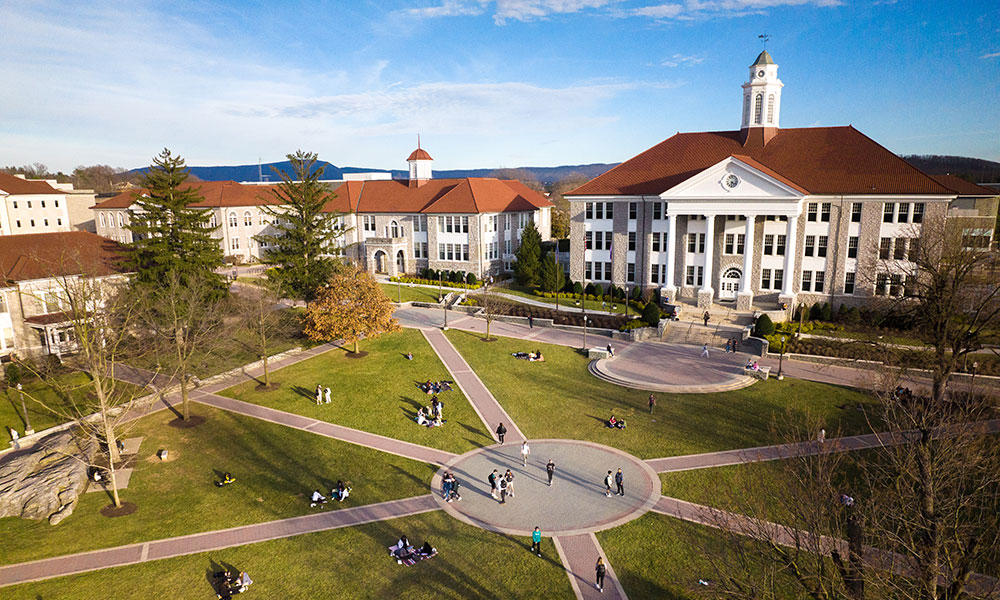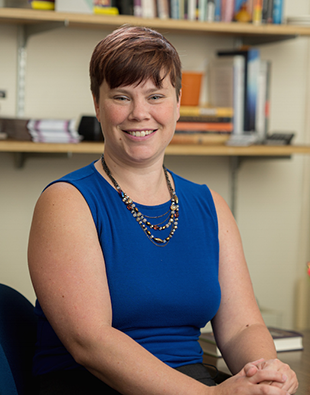Faculty Focus: Teaching With Compassion
News
SUMMARY: For Allison Fagan, learning is ethical, creative and collaborative. Turning an average semester course into a transformative experience, Fagan lifts up student and community voices, and her innovative teaching earned her top Provost and College of Arts and Letters teaching awards in 2021.
For Allison Fagan, professor of english, the most important learning is ethical, creative and collaborative. It also reaches beyond the conventional classroom. Whether working with JMU X-Labs or in the community, Fagan turns an average semester course into a transformative experience, lifting up student and community voices. Her innovative teaching earned her top Provost and College teaching awards in 2021.
 The Antiracist Gen Ed Project, a course Fagan designed in collaboration with JMU X-Labs and co-taught with Carah Whaley (Political Science); Amy Lewis (Music Education); and Tolu Odumosu (ISAT), brought theory into practice by focusing on problem-solving related to antiracism in the General Education curriculum. In addition to showing students how the General Education Program works, the course guided them to brainstorm and propose curricular changes. The students’ proposed solution—a tagging system to help enrolling students identify courses that address particular topics like diversity, equity and inclusion—has been implemented this fall.
The Antiracist Gen Ed Project, a course Fagan designed in collaboration with JMU X-Labs and co-taught with Carah Whaley (Political Science); Amy Lewis (Music Education); and Tolu Odumosu (ISAT), brought theory into practice by focusing on problem-solving related to antiracism in the General Education curriculum. In addition to showing students how the General Education Program works, the course guided them to brainstorm and propose curricular changes. The students’ proposed solution—a tagging system to help enrolling students identify courses that address particular topics like diversity, equity and inclusion—has been implemented this fall.
Courses like this validate students’ ideas and empower them to act. "My voice isn't the only voice in the classroom," said Fagan. "I'm trying to navigate a path that is supportive and amplifying rather than centering my perspective."
Including multiple perspectives is a cornerstone of Fagan’s teaching. She revised her long-standing Introduction to Ethnic American Literature course to center on stories from Harrisonburg’s immigrant and refugee population, one of the largest in Virginia. She aimed to raise students’ awareness about unique stories right in our community and to teach them to be good stewards of others’ stories. Students recorded interviews with local community members, then wrote and edited the final podcasts. The result? Harrisonburg 360, an ongoing multi-episode oral history podcast that raises the voices of this particular population.
Fagan has been teaching for over a decade, and projects like Harrisonburg 360 sustain her enthusiasm for her profession. “The things that do help me, the things that I’m interested in and excited about, are the things I get to teach.” Her excitement in the classroom—when talking about immigrant narratives, for instance—transfers to her own scholarship about unique narratives.
Teaching can be as transformative for faculty as for students. Fagan’s teaching philosophy and the most common piece of advice she gives to students have changed radically over the last few years. “If you had asked me three years ago, I would have said something like, you have to make revision a part of your life, because you shouldn’t think you’ll ever get it right on the first try.” But now, her answer is much more personal: “You matter. You are more than this class, this semester…what you have to say and what you see in the world matters. And there are people who want to hear what you have to say, and I am one of them.”
